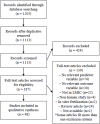Prenatal stress and child development: A scoping review of research in low- and middle-income countries
- PMID: 30592715
- PMCID: PMC6310253
- DOI: 10.1371/journal.pone.0207235
Prenatal stress and child development: A scoping review of research in low- and middle-income countries
Abstract
Introduction: Past research has shown relationships between stress during pregnancy, and related psychosocial health measures such as anxiety and depressive symptoms, with infant, child, and adult outcomes. However, most research is from high-income countries. We conducted a scoping review to identify research studies on prenatal stress and outcomes of the pregnancy or offspring in low- and middle-income countries (LMICs), and to synthesize the stress measures and outcomes assessed, the findings observed, and directions for future research.
Methods: We searched PubMed, Scopus, and PsycINFO for English-language abstracts published from Jan 1960-Jan 2017. Search terms were related to stress and psychosocial health; pregnancy; infant or child development; and LMICs.
Results: 48 articles were identified. Sixty percent of studies were in upper-middle, 25% in lower-middle, and 15% in low income countries. Most studies used questionnaires, either existing or tailor-made, to assess stress. Eight assessed cortisol. Most studies (n = 31) assessed infant outcomes at birth, particularly gestational age or preterm birth (n = 22, 12 showing significant relationships), and birthweight (n = 21, 14 showing significant relationships). Five studies analyzed outcomes later in infancy such as temperament and motor development, all showing significant results; and nine in childhood such as behavioral development, asthma, and physical growth, with eight showing significant results.
Conclusions: Results highlight the importance of prenatal stress on infant and child outcomes in LMICs. Methods used in high-income countries are successfully employed in LMICs, but tailored tools remain necessary. Careful assessment of covariates is needed to foster analyses of interactive effects and pathways. Studies including longer-term follow-up should be prioritized.
Conflict of interest statement
The authors have declared that no competing interests exist.
Figures
References
Publication types
MeSH terms
LinkOut - more resources
Full Text Sources
Medical
Miscellaneous


